In this post, I will teach you how to quickly and easily make your own homemade natural lemon vinegar cleaner. After all, what’s better than using a highly effective, non-toxic cleaner in your home? Probably one you can make yourself for the cost of pennies!
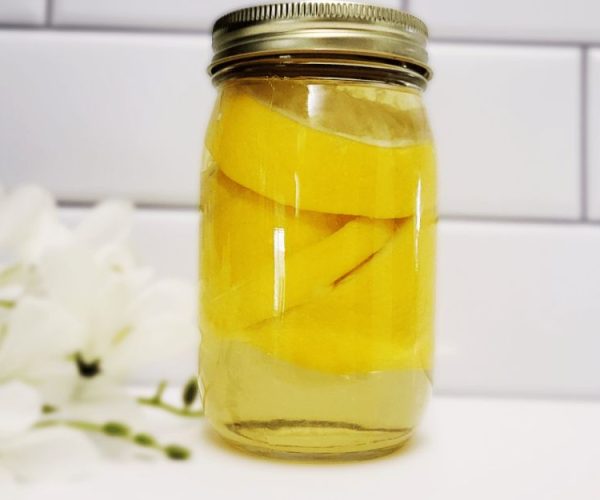
What is Natural Lemon Vinegar Cleaner?
Simply put, it is a natural lemon-infused vinegar cleaner that combines lemon scraps and vinegar. Once you put them together and let them infuse for a couple of weeks, you’ll be ready to use it on multiple surfaces in your home. Best part is, it’s natural, eco-friendly, and budget-friendly.
How Does It Work?
First, the vinegar alone contains acetic acid which is highly effective at breaking down dirt, grime, mineral deposits, and oils. It also contains antibacterial properties. Secondly, the lemon peels contain citric acid which enhances the vinegar’s cleaning power. Additionally, the oils from the lemon peel have antibacterial and antiseptic properties. What’s nice about the lemon is it masks the strong smell of the vinegar. However, the vinegar smell doesn’t linger around once it dries anyway.
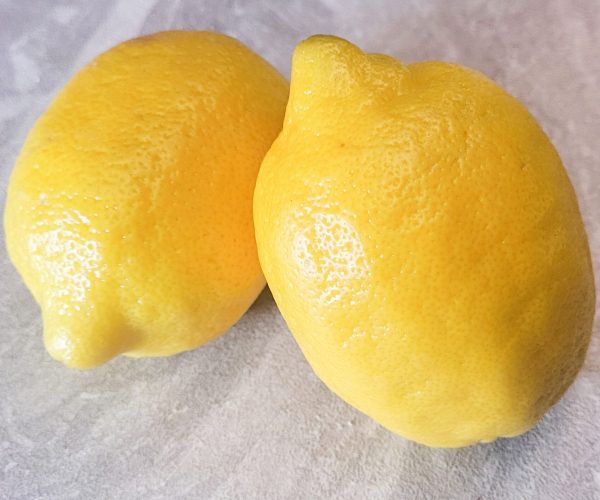
Using Natural Lemon Vinegar Cleaner
All Purpose Cleaner:
Suitable for countertops, sinks, and floors, this cleaner offers great versatility. However, it is important to note that it is not recommended for stone countertops like granite or marble. It can also dull the finish on hardwood floors, so it’s recommended to do a patch test first if you want to use it on those surfaces.
Glass Cleaner:
Takes the streak out of windows and mirrors, and shines them right up!
Bathroom Cleaner:
Tackles soap scum and hard water stains in your sinks, showers, and tubs.
Deodorizer:
Cleaning with lemon and vinegar will help neutralize lingering odors.
Benefits of Natural Lemon Vinegar Cleaner
- Non-Toxic: Safe to use around children and pets. Some popular commercial chemical cleaners have been found to contain potentially harmful ingredients like ammonia, chloroform, formaldehyde, and more.
- Eco-friendly: Reduces the need for commercial chemical cleaners.
- Cost-effective: After all, it utilizes just two ingredients, and one of them is literal scraps that you would have thrown away anyway.
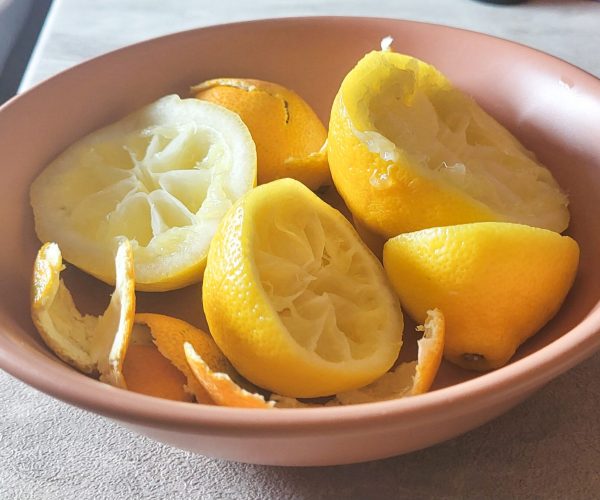
Why I Love This Recipe, and You Will Too
In our home, we try to use all natural, non-toxic cleaners as much as possible, including this lemon and vinegar household cleaner and homemade laundry soap. Additionally, we try to be resourceful; instead of throwing away our kitchen scraps, we compost them for our food garden, repurpose them, or regrow them. In this case, we are re-purposing our lemon scraps by mixing them with vinegar for an all-natural household cleaner.
Only two ingredients:
5-10 minutes of total hands-on time.
Versatile:
You can use it on multiple surfaces.
Non-toxic
Safe around children and pets.
How To Make Natural Lemon Vinegar Cleaner
1. Grab a glass jar
Note, the size of the jar does not really matter. Just try to fill it to the top with your lemon scraps.
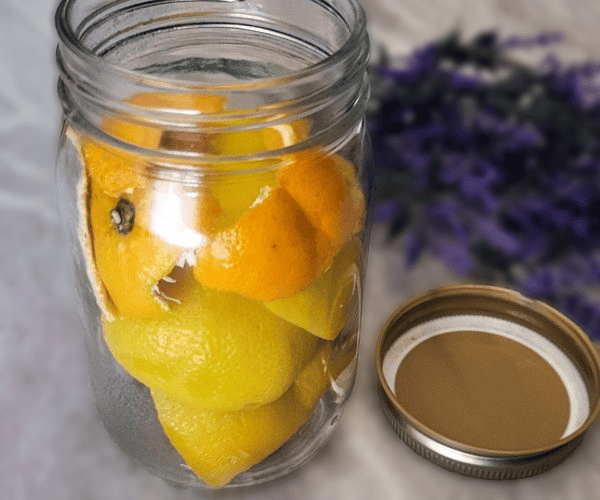
2. Add your lemon scraps
If you’re studying my photos, you may notice different colored lemon peels. This is because I actually added some orange peels as well. Orange peels also contain natural oils and antibacterial properties, so feel free to use those as well! After all, you can turn this into any citrus vinegar cleaner, not just lemon.
3. Add your distilled white vinegar
Pour the vinegar over the peels until it covers the peels, and seal the jar with the lid. Note, after the first day or two, you will have to top-off the vinegar again because the peels will initially absorb some of the vinegar.
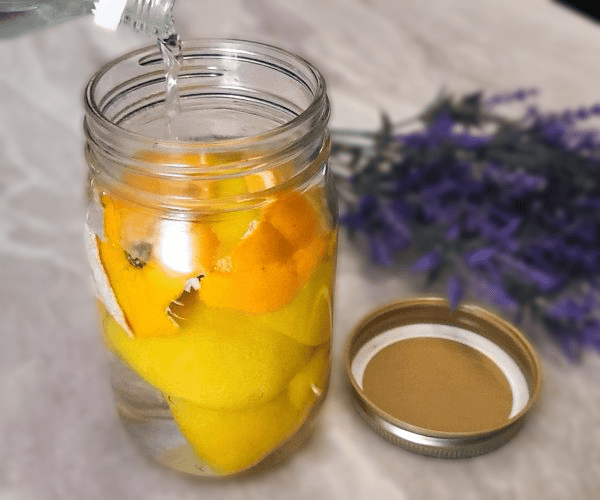
4. Let it rest
Finally, after about two weeks, you can strain the mixture by removing the lemon/orange scraps. At this point, you can either leave it as a concentrated liquid and dilute as needed, or dilute it all at once with a 1:1 ratio of water to cleaner. Personally, I leave it as a concentrated solution and dilute it in a spray bottle as needed. You are now ready to use your lemon infused vinegar cleaner! Check out this post next if you’re interested in making your own non toxic laundry soap.
DIY Lemon Vinegar Cleaner FAQs
Lemon and other citrus peels are preferred because they contain essential oils and citric acid that enhance the effectiveness of the cleaner.
Store it in a spray bottle or a jar, in a cool location away from direct sunlight.
Dilution is optional. For general cleaning, a 1:1 ratio of water to cleaner will work well. To combat tough stains or areas requiring a deeper clean, you can use it undiluted.
I would avoid using it on natural stone surfaces like marble, granite, and some hardwood floors because the acidity can cause damage. I do know some people who use it on their stone countertops with no problems, but if you choose to do so, make sure you test it first on a small, inconspicuous area.
I don't find that it is strong at all, especially when diluted, but you can always add a few drops of essential oils like lavender, eucalyptus, tea tree, bergamot, etc. to help mask the smell. Once the vinegar dries, the smell typically goes away; it won't linger around.
Lemon vinegar cleaner can last for several months. The acidity of the vinegar helps preserve the solution.
Yes, you can turn this into any citrus vinegar cleaning solution with other citrus peels like orange, lime, grapefruit, etc.

Homemade Natural Lemon Vinegar Cleaner Recipe
Equipment
- 1 Glass jar with lid
Ingredients
- 2 Lemon Peels/Scraps
- 2 Cups Distilled White Vinegar
Instructions
- Place the lemon peels/scraps into a clean glass jar. Note, the size of the jar will depend on how many lemon scraps you have.
- Pour the vinegar over the scraps until they are fully submerged, and then seal the jar with the lid. Store in a cool location away from direct sunlight.
- After about two weeks, strain the mixture by removing the lemon scraps.
- Pour the lemon infused vinegar into a spray bottle and dilute it with a 1:1 ratio of water to cleaner.
Notes
- Once you strain the solution, you can either leave it as a concentrated liquid and dilute it as needed, or you can dilute it all at once. I leave it as a concentrated solution and dilute as needed.
- For deeper cleans or to remove tough stains, use it undiluted.
- Vinegar can damage natural stone surfaces like marble and granite. It can also dull the finish of hardwood floors. Always test the cleaner on a small, inconspicuous area first to ensure it doesn't damage the surface.
- You can substitute the lemon scraps in this recipe for other citrus such as orange, grapefruit, lime, etc.





I’m not sure where yoou are getting your info, but good topic.
I needs too spend some time learning much moree or understanding more.
Thanks for fantastic information I was looking for this info for my mission